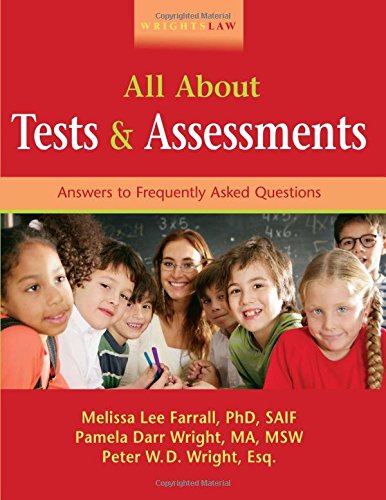Synopsis
In this comprehensive, easy-to-read book, you will find clear, concise answers to frequently asked questions about assessments, evaluations, and tests. You will learn: about psychological, academic, and neuropsychological tests and what these tests measure about selecting evaluators how to request a special education evaluation and how to provide parental consent about speech-language, physical and occupational therapy, processing, adaptive behavior, and functional behavior assessments test terms and the important realities about tests and assessment how small differences between tests can result in large differences in scores
Review
Wrightslaw: All About Tests and Assessments is a wonderful balance among brevity, thoroughness, and clarity. Chapter 3, Making Sense of Your Child's Tests Scores is an excellent chapter. Clear, concise, thorough. Dr. Melissa Farrall carefully and clearly explained the Bell Curve and told us how the standard deviations correspond to percentile ranks. Chapter 4, Intellectual Evaluations and IQ Testing, was a genuine pleasure to read. Such well-written material on a subject that is seldom written about very well. Chapters 3, 4, and 5 are superb. I cannot wait for the whole book. --John O. Willis, Ed.D., SAIF, Senior Lecturer in Education, Rivier University; Assessment Specialist, Regional Services and Education Center, Amherst, New Hampshire.
The best information on math testing I've seen in one place! The whole section on Math tests and subtests and the skills they measure is great information and much needed by parents. This is information EVERY parent needs to effectively advocate for their child. Test data is one of the most powerful tools you will ever have in your tool box. Thank you. --Debbie Larson, Parent of adult child with autism and special education advocate, Batavia, New York.
Wrightslaw: All About Tests and Assessments will aid anyone advocating on behalf of a child who is suspected of, or already diagnosed with, a disability. Wrightslaw: All About Tests and Assessments succeeds in explaining the complexities of assessments in language that is easy to understand, while also clarifying distinctions between learning disabilities and the methods available to support eligibility. In Chapter 7, Writing and Spelling Assessments, the explanation of Woodcock-Johnson Tests of Academic Achievement is great and easy to understand. --Patty Roberts, Esq., Director of William & Mary Law School s PELE Special Education Advocacy Clinic, Williamsburg, Virginia.
"About this title" may belong to another edition of this title.
